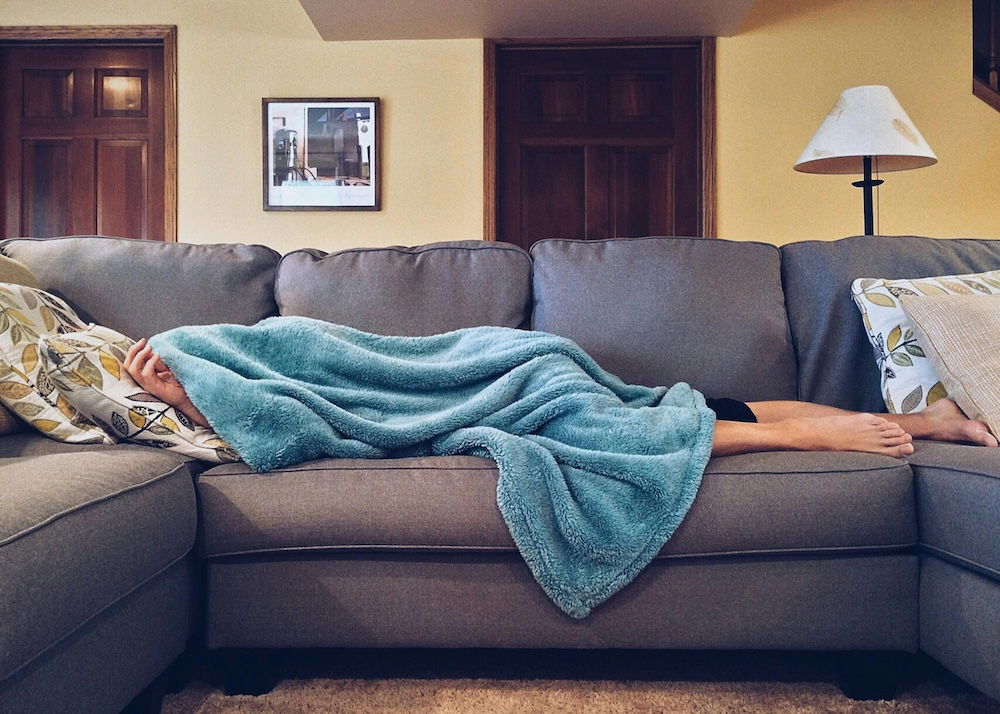Most people know that it is important to get between 7-9 hours of sleep a night to feel rested. But did you know that the quality of your sleep is also important for your health? If you don't get enough deep sleep, it can have a negative impact on your health. Your body doesn't have time to fully recover, which means you wake up tired and may suffer from concentration problems and forgetfulness.
Because of these negative effects, it is important to understand what deep sleep is, how much deep sleep you need and how to improve deep sleep.
What is deep sleep?
When you sleep, your body alternates between 4 stages of sleep. One of these phases is deep sleep.
Most of the time you sleep (75-80%), consists of NREM (Non Rapid Eye Movement) sleep. This includes the first 3 stages of sleep, including the deep sleep stage.
It takes an average of 90 to 120 minutes to go through all these stages. An adult person does this an average of 4 to 6 times per night.
Stage 1: Slumber Stage
The slumber stage is the transition between wakefulness and sleep. It is best thought of as the period when you doze off. Your eyes become heavy and eventually you fall asleep.
Phase 2: Light Sleep
During the second phase, you are relaxed but can still be easily woken. You may be awakened by sounds or a "sleep twitch," which you may recognize as the jerky movement you suddenly make in your sleep.
Phase 3: Deep sleep
During the deep sleep phase, you are relaxed and distant. Your breathing is slow and your heart beats slower. During this phase, you gain energy for the new day. There is a small chance you will wake up, but if this does happen you may feel very scattered.
Phase 4: REM sleep
Eventually you end up in REM (Rapid Eye Movement) sleep. This literally means "rapid eye movement" and implies that you are in dream sleep. In your REM sleep, the major muscles of your limbs are paralyzed. This may sound a bit scary, but it does have a function. In fact, if this were not the case, you would jump right out of bed to chase your dreams.
Why is deep sleep important?
While all sleep stages are important to feel your best, deep sleep is particularly important if you want to wake up feeling rested. But there are other reasons why deep sleep is so important.
During your deep sleep, glucose metabolism in your brain increases. This supports your short- and long-term memory and ability to learn in general. Also, enough deep sleep leads to body growth and development. This happens when the pituitary gland (gland in your body) secretes important hormones in your body, such as growth hormone. Other benefits of deep sleep include:
- Energy recovery
- Cell regeneration (repairing and renewing damaged cells)
- Increasing blood flow to muscles
- Promoting growth and repair of tissues and bones
- Strengthening the immune system
Signs you're not getting enough deep sleep
Do you wake up tired no matter how many hours you sleep? This could be a signal that you are not getting enough deep sleep. Other signals include:
- Reduced alertness and attention
- Difficulty learning
- Poor memory recall
- Cravings for unhealthy foods
How to improve your deep sleep
Do you recognize the above signs? If so, it is important to re-evaluate and adjust your sleep habits. Make sure you get enough sleep and go to bed and get back up at set times. Creating a sleep routine is hugely important to get enough deep sleep. Other healthy sleep habits include:
1. Exercise
It is important to exercise enough during the day. Make sure you exercise about 20 to 30 minutes a day. Do your errands by bike instead of by car and meet with a friend to go for a walk together.
2. Drink only water or tea before bed
Caffeine, alcohol and nicotine can disrupt your sleep. It quickly takes 6 hours for caffeine to disappear from your body. Therefore, do not drink coffee and other caffeinated drinks such as energy drinks and cola later in the day.
3. Listen to binaural beats
Binaural beats involve playing two tones that are only slightly different from each other. The difference between the tones causes you to perceive a third tone. This perceived tone is also called a binaural beat. Research has shown that binaural beats with delta waves can improve deep sleep.
The Meditation Moments app has several binaural beat tracks of different frequencies. Listen to binaural beats before bed to improve deep sleep.
4. Avoid blue light before sleeping
According to research, exposure to blue light before sleeping causes less deep sleep. This is because blue light inhibits the production of melatonin - this is the substance that causes our bodies to get tired when it gets dark outside. So exposure to blue light not only causes our sleep quality to deteriorate, but also makes it harder for us to fall asleep.
Instead of trying to scroll yourself to sleep, choose to end your evening with a guided meditation. In the Meditation Moments app, you'll find several evening meditations specifically designed to help you sleep better. Play the meditation, close your eyes and fall asleep effortlessly.
Meditation for deep sleep
Did you know that meditation also promotes deep sleep? A sleep meditation not only helps you fall asleep faster, but also ensures that you get enough deep sleep.
The Meditation Moments app has several sleep meditations in the Sleep Good category that are specifically designed to help you sleep better.
Try Meditation Moments 7 days free
Start free trial
No matter how healthy we eat and how much we exercise. If we don't optimize our sleep, we will never feel good mentally and physically. If the tips in this article do not work, we recommend that you consult a doctor or physician.
Share article




















